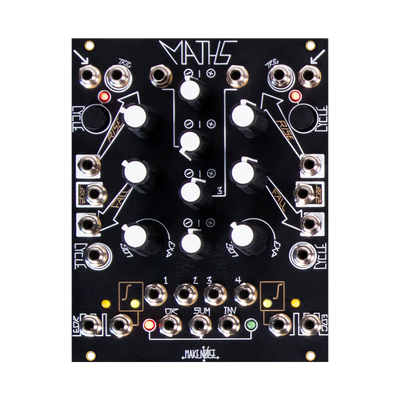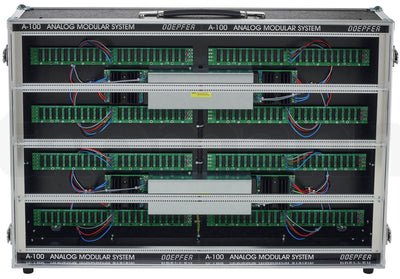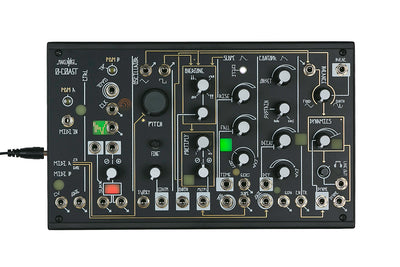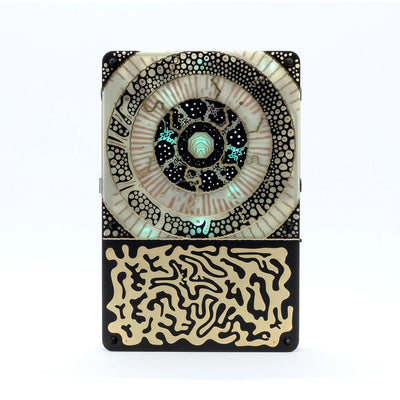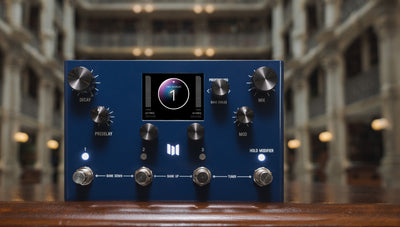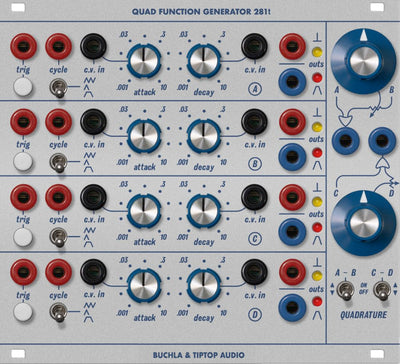Overview
Bionic Lester Mark III is a two channel 12dB state variable digital filter inspired by the best of late-1990s "virtual analog“ filters. Each filter section has three CV inputs. The Mark III preset system stores eight fully programmed panel setups, instantly recalling everything under the harshest demands of performance. The Morph mode allows smooth fading between all of these presets. The controls are arranged for maximum tweakability and the OLED display displays the cutoff frequency in hertz, resonance amount, and filter type.
Features
Input overdrive, resonance, and filter output mode mixing
Dual 2-Pole State-Variable Filter
Dual VCA
Dual overdrive
Filter mode continuously adjustable via CV
Configurable signal routing
CV inputs can be assigned freely
Eight memory locations
Filter Modes & Outputs
Details
BIONIC LESTER MARK III is a 2-channel 2-pole state-variable digital filter with an unusual amount of good sonic character. The filter mode is continuously variable under manual or CV control, smoothly fading from lowpass to bandpass to highpass to notch to allpass with a single motion. The resonance stops just short of self-oscillation. A digital VCA controls the amplitude and the distortion of the input signal pre-filter. The filters have independent inputs and outputs, and an additional Mix output with balance control. The filter design was initially inspired by the best of late-1990s “virtual analog” filters and has gone far beyond.
The audio input controls have dual behavior. When the control (or CV input) is turned from zero position to the center, it operates as a simple gain control for that input. When turned past the center position towards the maximum, the signal will begin to soft-clip, adding hard clipping as the maximum is approached. This smooth and subtle distortion adds violence to otherwise unremarkable input material, generating additional harmonic content for the filter to process. The digital VCA that controls the gain and distortion functions is aware of the input signal’s zero crossing, eliminating “clicking” noises when the gain is modulated.
CV
Each filter section has three CV inputs. The first is a high-speed input hardwired to the filter’s cutoff frequency, appropriate for snappy envelopes and slow moving voltages alike. The other two inputs (one with attenuverter control) are freely assignable to any of the filter parameters (cutoff, resonance, mode, gain), storable in a preset. The Mark III preset system stores eight fully programmed panel setups, instantly recalling everything under the harshest demands of performance. The Morph mode allows smooth fading between all of these presets.
Link Mode
Activate Filter B’s LINK control for patch-free routing of the filter’s control or audio signal. You can achieve dual-peak resonance, cable-free series routing, cascaded 4-pole filtering (with two stages of distortion), and full stereo using only one set of filter controls. The input normalization, LINK settings, and parallel mix output further reduce cable clutter while rapidly patching an elaborate signal flow.
Physical Features
The controls are arranged for maximum tweakability and minimum cable interference, with metal-shaft potentiometers attached to the panel on the large knobs. The Mark III OLED display displays the cutoff frequency in Hertz, resonance amount, and filter type morph. The CV inputs process all input voltages between -10 to +10 volts.
MORPHING PRESET MANAGER
All Mark III Series modules from Industrial Music Electronics come with a standard preset manager interface. This manager is the product of determined user interface research, and the successful solution to a number of modular synthesizer performance questions. The MORPHING PRESET MANAGERenables immediate control and recall of all panel parameters and significantly reduces the number of patch cords required to recreate carefully patched sounds in a live situation. It provides a new dimension of intense sonic transformation suitable for deep sound design or extended performance technique, for when you just don’t have enough cables or limbs to move the controls in the way that your imagination demands.
The interface consists of an OLED display, rotary encoder, CV input, and an attenuator control. The CV input responds to positive and negative voltages. Each module has a setting to limit the operation of the preset manager: for example, the Hertz Donut and Piston Honda oscillators’ managers can operate ONLY on the wave parameters, or on ALL controls including the frequency. The user may prefer to use the manager only as a timbral control, or also as the master pitch control in a sequenced performance. The interface and voltage thresholds are standardized across all Mark III modules, so a simple unbuffered multiple is sufficient to simultaneously drive the preset state of several modules.
Manual
https://ime-assets.s3.amazonaws.com/uploads/manual/manual/28/lestermk3manual.pdf
http://www.industrialmusicelectronics.com/products/23



